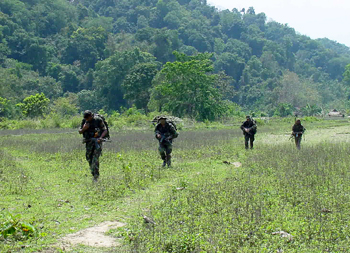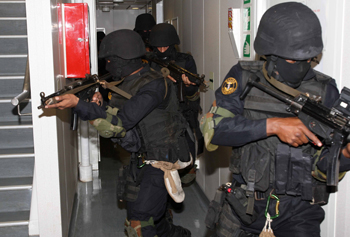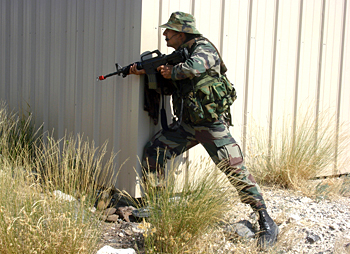INDIAN ARMED FORCES CHIEFS ON OUR RELENTLESS AND FOCUSED PUBLISHING EFFORTS

SP Guide Publications puts forth a well compiled articulation of issues, pursuits and accomplishments of the Indian Army, over the years

"Over the past 60 years, the growth of SP Guide Publications has mirrored the rising stature of Indian Navy. Its well-researched and informative magazines on Defence and Aerospace sector have served to shape an educated opinion of our military personnel, policy makers and the public alike. I wish SP's Publication team continued success, fair winds and following seas in all future endeavour!"

Since, its inception in 1964, SP Guide Publications has consistently demonstrated commitment to high-quality journalism in the aerospace and defence sectors, earning a well-deserved reputation as Asia's largest media house in this domain. I wish SP Guide Publications continued success in its pursuit of excellence.
Special Operations Command needed urgently
 |
By Lt. General P.C. Katoch Former Director General of Information Systems, Indian Army |



Amidst numerous recommendation of the Naresh Chandra Committee, one was establishment of a Special Operations Command. India has been combating proxy wars for over past three decades. Time and again, India has tried to establish friendly ties with Pakistan but the response every time has been another terror attack or cross border action. The recent terror attacks in Dinanagar, Gurdaspur, Pathankot and Pampore are proof that any change in Pakistan’s state policy of terrorism is unlikely to happen. In backdrop of sub-conventional warfare, the necessity of a Special Operations Command is obvious to carry the sub-conventional war on Pakistani soil. Amir Mir wrote in the Asia Times as far back as on 2nd Sep 2011, “The resurgence of the Jaish-e-Mohammad shows that the Pakistani establishment remains deeply embroiled with its jihadi proxies and continues to treat them as the civilian face of the Pakistani army”. A recent article in New York Times too talks of the Pakistani army reviving JeM.
So while India talks of the complicity of JeM, in particular its jaundiced chief Azhar Masood in the Pathankot attack, Pakistan has gone ahead and filed a FIR against “unknown persons”. Obviously no one in the military supported JeM will be brought to book same as the perpetrators of the 26/11 Mumbai terrorist attack especially since the personal security of the prosecuter has been removed despite his predecessor gunned down. By available indications, the Pampore attack was engineered by the LeT courtesy ISI. China supports Pakistan’s anti-India jihadi policy and is doing ample mischief in our northeast and in supporting the Maoists. Both China and Pakistan possess advance sub conventional capabilities, we are lagging behind. This is a strategic asymmetry we need to address. The state of our nine major intelligence agencies, the state is not very different; different channels of command; any semblance of synergy overshadowed by ego and turf battles; questionable tasking in absence of an undefined cohesive national security strategy and national security objectives not spelt out; thoughthey also report to the NSA, they are not under Parliamentary oversight, not that the appointment of NSA itself has and constitutional standing. Employing Special Forces strategically is a different ball game from using them as super infantry in counter insurgency within India and that too with adequate other forces to do these tasks.
Special operations are "special" or unconventional and carried out by dedicated Special Forces using unconventional methods and resources, performed independently of or in conjunction with conventional military operations. Such operations are usually conducted at operational and strategic levels in low-profile manner that aims to achieve the advantages of speed, surprise, and violence of action against an unsuspecting target. Our special operations experiments with organizations like LTTE and EROS were dismal failures because our external intelligence agencies think that such operations are their exclusive domain whereas special operations must have adequate mix of Special Forces and external intelligence. Tasks which are at the strategic level are of politico-military nature, controlled by the highest political authority. Most of these tasks are without reference to the military. This is where the Special Operations Command (SOC) is needed based on about two-three battalions worth since it is not a numbers game, with the nucleus taken from existing Special Forces. Special Forces Teams (SFTs) of SOC individually may comprise 25-50 or more depending on the country / region and its relative importance in terms of national security objectives. They should have institutionalized access to integrated intelligence, varied insertion and extraction capability and adequate support elements. It is important to remember that special operations are typically carried out with limited numbers of highly trained personnel that are adaptable, self-reliant and able to operate in all environments, and able to use unconventional combat skills and equipment, and special operations are usually implemented through specific, tailored intelligence The PM would need an advisory cell comprising serving and veteran Special Forces and R&AW officers tasked with: evolving a national doctrine and strategy for employment of Special Forces, oversee their manning, equipping, training, consolidation, operational and intelligence inputs, inter-agency synergy, strategic tasking and monitoring of all missions.
The cell would continuously coordinate all source intelligence gathering and automated analysis and assessments (short, medium and long term) supported by an automated decision support system and real time dissemination to all concerned including provision of required operating picture. Balance of our Special Forces should be reorganized into an Integrated Commando Command (ICC) directly under the CDS, integrating the Army Special Forces, MARCOS, Garuds, Special Action Groupss of NSG and Special Groups of SFF for employment at the operational level including tactical tasks supporting military missions. The Commander of ICC must be from Special Forces who should have commanded a Special Forces unit. Special Forces are not meant for internal security. That is why the CCS note on which the NSG was raised had required the Army to provide manpower on deputation “only” for 10 years, which has not been implemented. It is time that the police take on their own responsibilities for internal security more seriously. For internal security requirements, the police forces must raise their own specialists.
Photo Credit: Indian Army, Indian Navy, PIB





